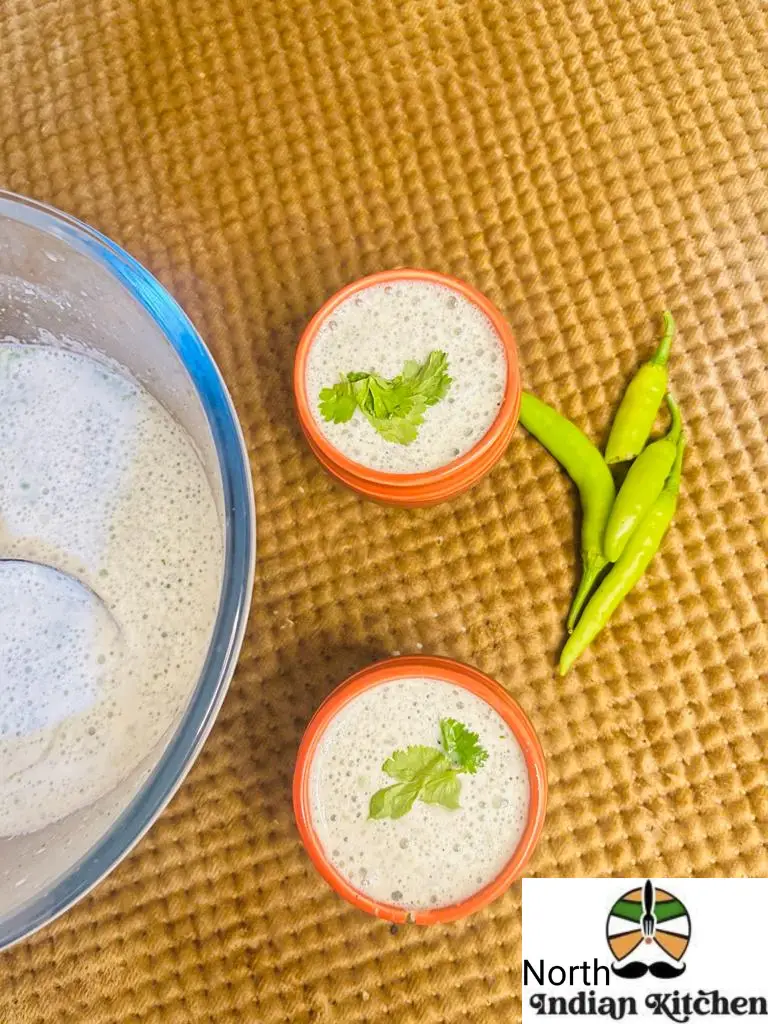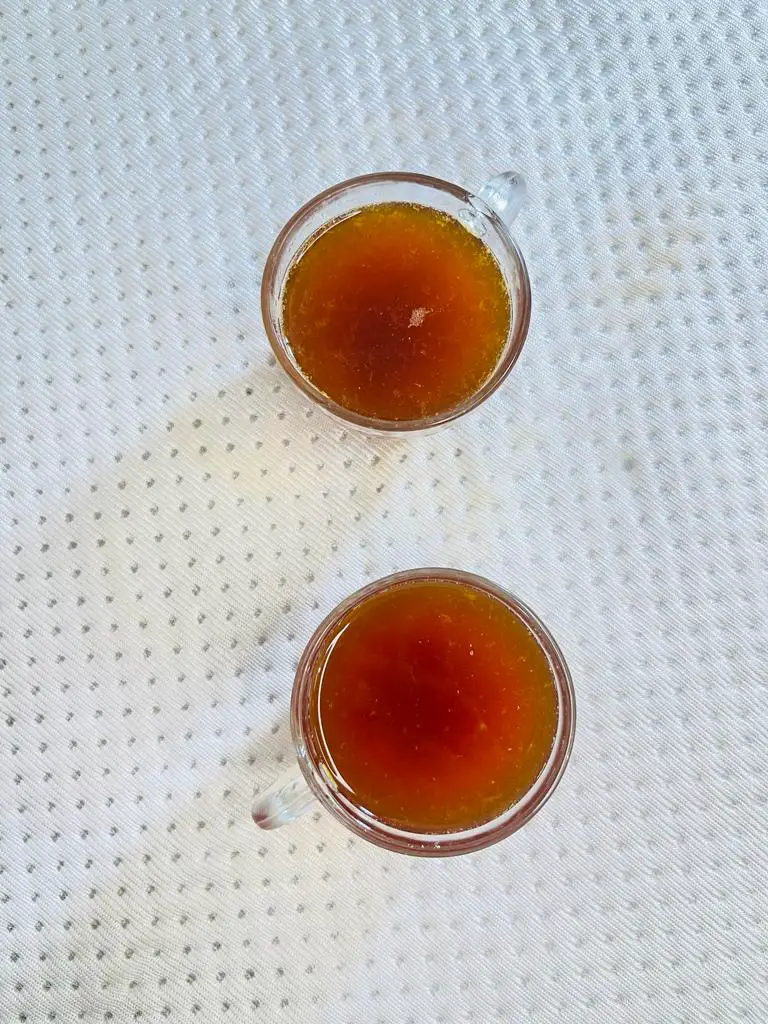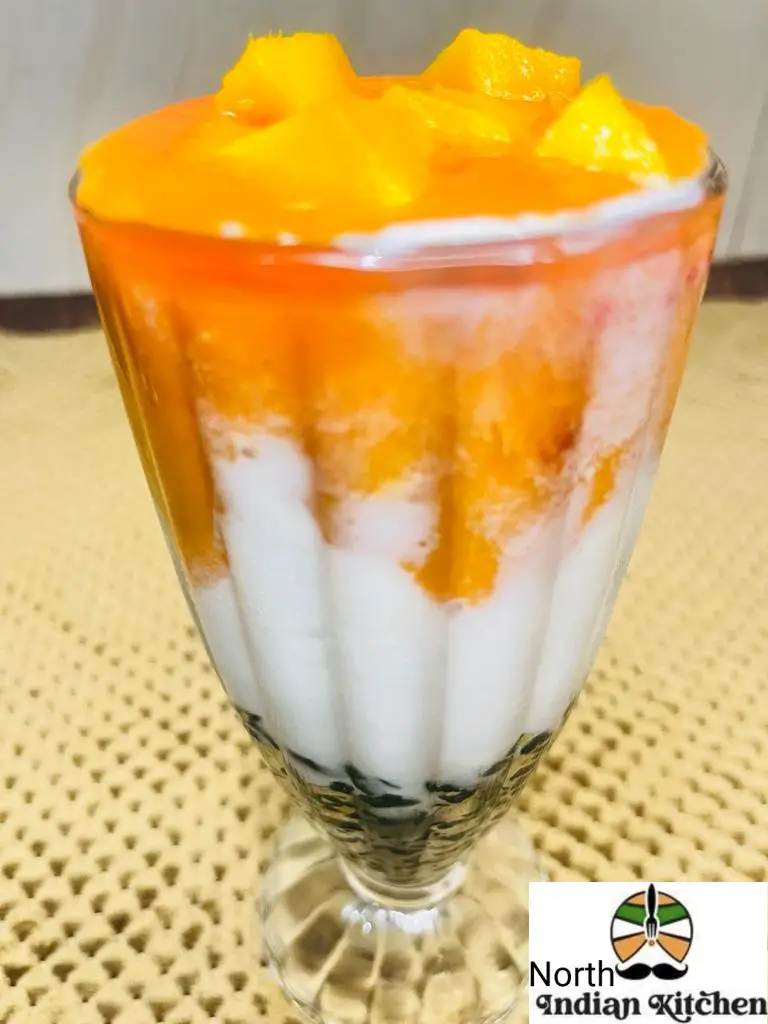Sweet Basil Seeds Drink | Sabja Seeds Drink for Summer Recipe
Basil seeds, also known as sabja seeds or tukmaria, have gained popularity as a healthy ingredient in various culinary applications, including beverages. Basil seed drink, made by soaking basil seeds in water or other liquids, is a refreshing and nutritious beverage that offers several health benefits.
The basil plant, scientifically known as Ocimum basilicum, is native to tropical regions of Asia, particularly India and Thailand. Traditionally, basil seeds have been used in Ayurvedic and traditional medicine for their medicinal properties. Today, they are widely consumed for their nutritional value and unique texture.
Basil seeds are tiny black seeds that resemble chia seeds but have a milder flavor. When soaked in liquid, they absorb the liquid and develop a gel-like outer layer while retaining their crunchiness at the core. This unique texture adds an interesting element to beverages, making basil seed drink is a popular choice among health-conscious individuals.
To prepare basil seed drink, the seeds need to be soaked in water or fruit juices for about 10-15 minutes until they form a gel-like consistency. The soaked seeds can then be combined with various ingredients like fruits, syrups, honey, or yogurt to create a refreshing and flavorful beverage. Some popular variations include basil seed lemonade, basil seed smoothies, and basil seed-infused herbal teas.
The benefits of consuming basil seed drink are numerous. Basil seeds drinks are a rich source of dietary fiber, which aids in digestion and promotes a feeling of fullness, making it a suitable option for those looking to manage their weight. They also contain essential nutrients like iron, calcium, magnesium, and antioxidants, which support overall health and well-being.
Additionally, basil seed drink is believed to have cooling properties, which makes them particularly popular in tropical climates. They are often consumed during the summer months to help alleviate heat and cool the body.
Overall, basil seed drink offers a refreshing and nutritious way to incorporate the health benefits of basil seeds into your diet. Whether enjoyed on its own or as an addition to other beverages, this unique drink provides a delightful and healthy alternative for those seeking a flavorful and wholesome beverage option.
Here are some key points about Sabja Seeds:
Nutritional Content: Sabja seeds are low in calories and rich in nutrients. They contain essential minerals like iron, magnesium, and calcium, as well as vitamins A and K. They are also a good source of dietary fiber and contain some protein and healthy fats.
Cooling Properties: In traditional medicine, sabja seeds are believed to have cooling properties and are often consumed during hot weather or to alleviate heat-related ailments. They are known to provide a cooling sensation when consumed, making them popular in tropical regions.
Digestive Benefits: Sabja seeds are valued for their digestive properties. The high fiber content helps promote healthy digestion, prevent constipation, and support bowel regularity. They are also believed to have carminative properties, which means they can help relieve bloating and flatulence.
Appetite Control: The gel-like texture of sabja seeds when soaked in liquid can create a feeling of fullness, which may help in appetite control and weight management. Adding soaked sabja seeds to beverages or meals can provide a sense of satiety and reduce overeating.
Blood Sugar Regulation: Sabja seeds may help regulate blood sugar levels. The fiber content in these seeds can slow down the absorption of sugar into the bloodstream, preventing sudden spikes in blood glucose levels. However, individuals with diabetes should still monitor their blood sugar levels and consult with a healthcare professional before incorporating sabja seeds into their diet.
Antioxidant Properties: Sabja seeds contain antioxidants that help protect the body against oxidative stress and damage caused by free radicals. Antioxidants play a role in reducing inflammation and may contribute to overall health and well-being.
Culinary Uses: Sabja seeds are commonly used in a variety of culinary applications. They can be added to beverages like lemonades, smoothies, and herbal teas, where they provide a pleasant texture and visual appeal. Sabja seeds are also used in desserts, puddings, falooda (a popular Indian dessert), and even as a topping for salads and yogurts.
It’s important to note that while sabja seeds have numerous potential health benefits, individual results may vary, and it’s always a good idea to consult with a healthcare professional or nutritionist before making significant dietary changes or using them for therapeutic purposes.
How to Make Basil Seeds Drink
- Rinse the basil seeds: Place the 1 tablespoon basil seeds in a fine-mesh sieve or strainer and rinse them under running water to remove any impurities.
- Soak the basil seeds: In a glass or bowl, add the rinsed basil seeds and pour in 1 cup of water. Stir the seeds gently to ensure they are evenly distributed in the water. Let the seeds soak for about 10-15 minutes. During this time, the seeds will absorb the water and form a gel-like coating around them.

- Customize the flavor (optional): If desired, you can add flavor to your basil seed drink. Squeeze the juice of half a lemon or add other fruits like orange, strawberry, or mango juice to the soaked basil seeds. This will give your drink a tangy or fruity taste.

- Sweeten the drink (optional): If you prefer a sweeter drink, you can add a sweetener of your choice to the basil seed drink. Common options include sugar, honey, agave syrup, or any other natural sweetener. Adjust the sweetness according to your taste preferences.
- Mix well and serve: Once the basil seeds have soaked and you’ve added any desired flavors or sweeteners, give the mixture a good stir to combine all the ingredients. You can also add ice cubes to make it more refreshing. Pour the basil seed drink into glasses and serve immediately.

Note: The quantity of water, sweetener, and flavorings can be adjusted according to your taste preferences. Feel free to experiment with different fruits, herbs, or spices to create your unique variations of basil seed drink.
Remember to drink it while the basil seeds are still fresh and crunchy, as they may lose their texture if left to sit for too long. Enjoy the cooling and nutritious benefits of your homemade basil seed drink!
Expert Tips
Soaking Properly: When preparing basil seed drinks or using them in recipes, make sure to soak the seeds properly. Soaking them in water or liquid for about 10-15 minutes allows them to develop the desired gel-like texture and makes them easier to consume.
Hydration Ratio: When soaking basil seeds, maintain an appropriate ratio of liquid to seeds. Generally, using about 1 cup of liquid for 1-2 tablespoons of basil seeds is a good guideline. Adjust the amount of liquid according to your desired consistency and recipe requirements.
Flavor Combinations: Experiment with different flavor combinations to enhance the taste of basil seed drinks. Add citrus fruits like lemon or lime, berries, mint leaves, or even herbal infusions to create a refreshing and flavorful beverage.
Sweeteners: If you prefer a sweeter drink, choose natural sweeteners like honey, agave syrup, or stevia to avoid excessive sugar intake. Adjust the amount of sweetener to your taste preferences.
Texture in Beverages: Basil seeds can add an enjoyable texture to beverages. Consider adding them to smoothies, shakes, or even iced teas to create a unique and satisfying drinking experience.
Balancing Quantities: While basil seeds offer health benefits, moderation is key. Aim to include them as part of a balanced diet rather than relying solely on them for nutritional intake. It’s important to consume a variety of other foods to meet your overall nutritional needs.
Storage: Store basil seeds in an airtight container in a cool, dry place, away from direct sunlight. This helps maintain their freshness and nutritional quality for a longer period.
FAQs
Q. Can I eat basil seeds raw?
A. Basil seeds are not typically eaten raw. They are usually soaked in water or other liquids before consumption. Soaking them helps them develop a gel-like texture and makes them easier to consume.
Q. How long should I soak basil seeds?
A. Basil seeds should be soaked for about 10-15 minutes. During this time, they absorb water and develop a gel-like coating around them. This process enhances their texture and makes them more palatable.
Q. Can I use basil seeds instead of chia seeds?
A. Yes, basil seeds can be used as a substitute for chia seeds in many recipes. They have a similar texture and nutritional profile. However, keep in mind that basil seeds are smaller than chia seeds, so you may need to adjust the quantities accordingly.
Q. Are basil seeds good for weight loss?
A. Basil seeds can aid in weight management due to their high fiber content. The fiber helps create a feeling of fullness, which may reduce overeating. However, it’s important to remember that weight loss is a complex process, and incorporating basil seeds alone will not guarantee weight loss. A balanced diet and regular exercise are key factors.
Q. Can I give basil seeds to children?
A. Basil seeds can be given to children in small quantities and when properly soaked. However, it’s important to monitor their intake and ensure they are comfortable with the texture. Always consult with a healthcare professional before introducing new foods to a child’s diet.
Q. Can basil seeds help with constipation?
A. Yes, basil seeds are known for their high fiber content, which can help promote healthy digestion and relieve constipation. However, it’s important to consume an adequate amount of water along with the seeds to facilitate their movement through the digestive system.
Q. Can I consume basil seeds during pregnancy?
A. It’s best to consult with a healthcare professional before consuming basil seeds during pregnancy. Limited information is available on their safety during pregnancy, and individual circumstances may vary.
Q. Are there any specific storage requirements for basil seeds?
A. Store basil seeds in an airtight container in a cool, dry place, away from direct sunlight. This helps maintain their freshness and nutritional quality for a longer period.
If you like our recipe then Try our Other Summer Drink Recipes
Please be sure to rate this recipe or leave a comment below if you have made it. For more vegetarian & non – vegetarian inspirations, Sign Up for my emails or follow me on Instagram, Youtube, Facebook, Twitter or Pinterest.
Sweet Basil Seeds Drink Recipe Card
Equipments
Ingredients
- 1 tablespoon Basil seeds
- 2 cups Warm Water
- 1-2 tablespoons Sweetener (Sugar, honey)
- 1-2 tablespoons Lemon juice
Instructions
- Rinse the basil seeds: Place the basil seeds in a fine-mesh sieve or strainer and rinse them under running water to remove any impurities.2. Soak the basil seeds: In a glass or bowl, add the rinsed basil seeds and pour in 1 cup of water. Stir the seeds gently to ensure they are evenly distributed in the water. Let the seeds soak for about 10-15minutes. During this time, the seeds will absorb the water and form a gel-like coating around them.3. Customize the flavor (optional): If desired, you can add flavor to your basil seed drink. Squeeze the juice of half a lemon or add other fruits like orange, strawberry, or mango juice to the soaked basil seeds. This will give your drink a tangy or fruity taste.4. Sweeten the drink (optional): If you prefer a sweeter drink, you can add a sweetener of your choice to the basil seed drink. Common options include sugar, honey, agave syrup, or any other natural sweetener. Adjust the sweetness according to your taste preferences.5. Mix well and serve: Once the basil seeds have soaked and you've added any desired flavors or sweeteners, give the mixture a good stir to combine all the ingredients. You can also add ice cubes to make it more refreshing. Pour the basil seed drink into glasses and serve immediately.Your Basil seeds drink is ready
Video
Notes
- Basil seeds can expand and form a gel-like coating when soaked in water or liquid. To avoid choking, ensure that basil seeds are properly soaked and hydrated before consuming.
- Some individuals may have allergies to basil seeds or related plants in the Lamiaceae family. If you have known allergies to herbs or seeds, it's best to avoid basil seeds or consult with a healthcare professional before consuming them.
- Purchase high-quality, food-grade basil seeds from trusted sources to minimize the risk of contamination.








